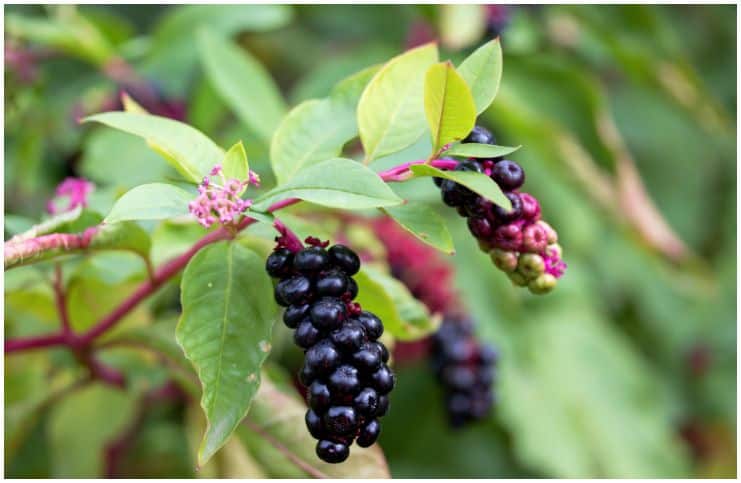Pokeberry (Pokeweed or Phytolacca Americana) – Side Effects, Facts, Uses, Health Benefits:
Facts
American pokeweed (Pokeberry or Phytolacca americana), or simply pokeweed, is a herbaceous perennial plant in the pokeweed family Phytolaccaceae, growing up to 2 meters (8 feet) in height.
Common names of this plant include – red ink plant, American nightshade, garget, redweed, inkberry, cancer Root, pigeon berry, poke root, crowberry, and chui xu shang lu.
The name ”Phytolacca” is derived from the Greek phyton ”a plant” and the modified Latin ”lacca,” translating as ”lake,” having reference to the crimson color of the herb’s juice.
The plant is native to eastern North America, the Midwest, and the Gulf Coast, with more diffuse populations in the Far West. The plant also grows in southern Europe, China, North Africa, and in the Sandwich Islands. In the wild, this plant is easily found growing in recently cleared areas, pastures, and woodland openings, edge habitats and in waste places.
Health benefits and medicinal uses of Pokeberry
The berries of Phytolacca Americana are very interesting, as they contain medicinal compounds and fewer toxins than other parts of the herb, with the exception of their seeds. The truth is that this plant, when properly used, is both effective and safe.
Phytolacca Americana can also be a serious poison when consumed improperly but is far less poisonous than some other pharmaceutical drugs and many plants.
Immune system
It has a long history of medicinal use, being employed customarily in the treatment of diseases related to a damaged immune system.
In some recent studies, it was shown that Phytolacca Americana has the capacity to interact with proliferating T cells (a type of lymphocyte that plays an important role in cell-mediated immunity).
In addition, the presence of Pokeberry antiviral protein, also known as PAP, in the plant was featured in the studies. It was established that PAP has some very promising medicinal benefits that can be used against HIV.
Moreover, the PAP protein (pokeweed antiviral protein) may have anti-tumor effects. Some studies have shown that certain formulations of pokeweed antiviral protein may be beneficial against some kinds of cancer cells that depend on hormones to grow, such as ovarian, breast, and prostate cancer.
Lymphatic system
The lymphatic system is a network of organs and tissues that help rid the physical body of waste, toxins, and other unwanted materials.
The plant contains certain chemical compounds like tannins, triterpene saponins, glycoproteins, resins, many other substances and also an active glycoprotein lectin named pokeweed mitogen which stimulates lymphocytes (a type of white blood cell) and can cause hemagglutination.
This particular function of this herb helps in acting chiefly on the skin, glandular structures, and mucous membranes, overcoming lymphatic conditions. Our lymphatic system plays a crucial role in allowing the immune system to work efficiently.
Homeopathy
The homeopathic remedy from this plant (homeopathic remedies are highly diluted, contrary to herbal preparations that contain much higher amounts of the active ingredient) is prescribed for a number of other purposes, particularly to relief different types of pains, such as lower back pain.
According to ancient medical documents, Phytolacca Americana has been traditionally used to treat various health conditions, such as syphilis, diphtheria, emesis (vomiting), rheumatoid arthritis, adenitis (inflammation of any gland), scabies, fungal infections, mumps, conjunctivitis, chronic infections, tonsillitis, and dysmenorrhea.
Weight loss
Advocators of this medicinal plant claim that it is also effective for facilitating weight loss.
Native American tribal healers use the roots of Phytolacca Americana to purify the blood and to reduce fever.
Side effects of pokeberry (pokeweed – Phytolacca Americana)
Children are most commonly poisoned by eating raw berries. Infants are particularly sensitive and have died from eating only a few raw berries.
Historically, Phytolacca Americana poisonings were usual in eastern North America during the 19th century, particularly from the use of tinctures as antirheumatic preparations and from ingestion of roots and berries that were mistaken for Jerusalem artichoke, parsnip, or horseradish.
”Roots are the most poisonous, stems and leaves are intermediate in toxicity (toxicity increases with maturity), and berries are the least toxic… While the berries are the least poisonous part of the medicinal plant, never eat the seeds or the root.” – Ohio Agricultural Research and Development Center
The toxins found in this plant are – a resin (phytolaccatoxin), an alkaloid (phytolaccine), and a saponin (phytolaccigenin).
Their side effects can range from diarrhea, rapid heartbeat, vomiting, convulsions, internal bleeding, and much more, up to and including death. Furthermore, consuming this herb has been linked with low blood pressure, nausea, severe vomiting, and breathing problems.
Pregnant and breastfeeding women should never consume pokeweed berries or other parts of the plant. Eating the berries can also cause menstrual irregularities.
Additionally, Phytolacca Americana may interact with BP-lowering medications and anti-inflammatory drugs. The plant must also be avoided while using heparin, digoxin, and diuretic drugs.
READ THIS NEXT:
Pickled Mustard Seeds (Black, Brown, Yellow) – Side Effects
Tribulus Terrestris – Side Effects & Health Benefits
Fenugreek: Side Effects & Health Benefits
Hyacinth Beans (Lablab Purpureus) – Side Effects
References https://www.ncbi.nlm.nih.gov/pmc/articles/PMC3341375/ https://www.ncbi.nlm.nih.gov/pubmed/22238657 https://www.ncbi.nlm.nih.gov/pubmed/23553997


use of this drug for 6 months caused severe hair loss